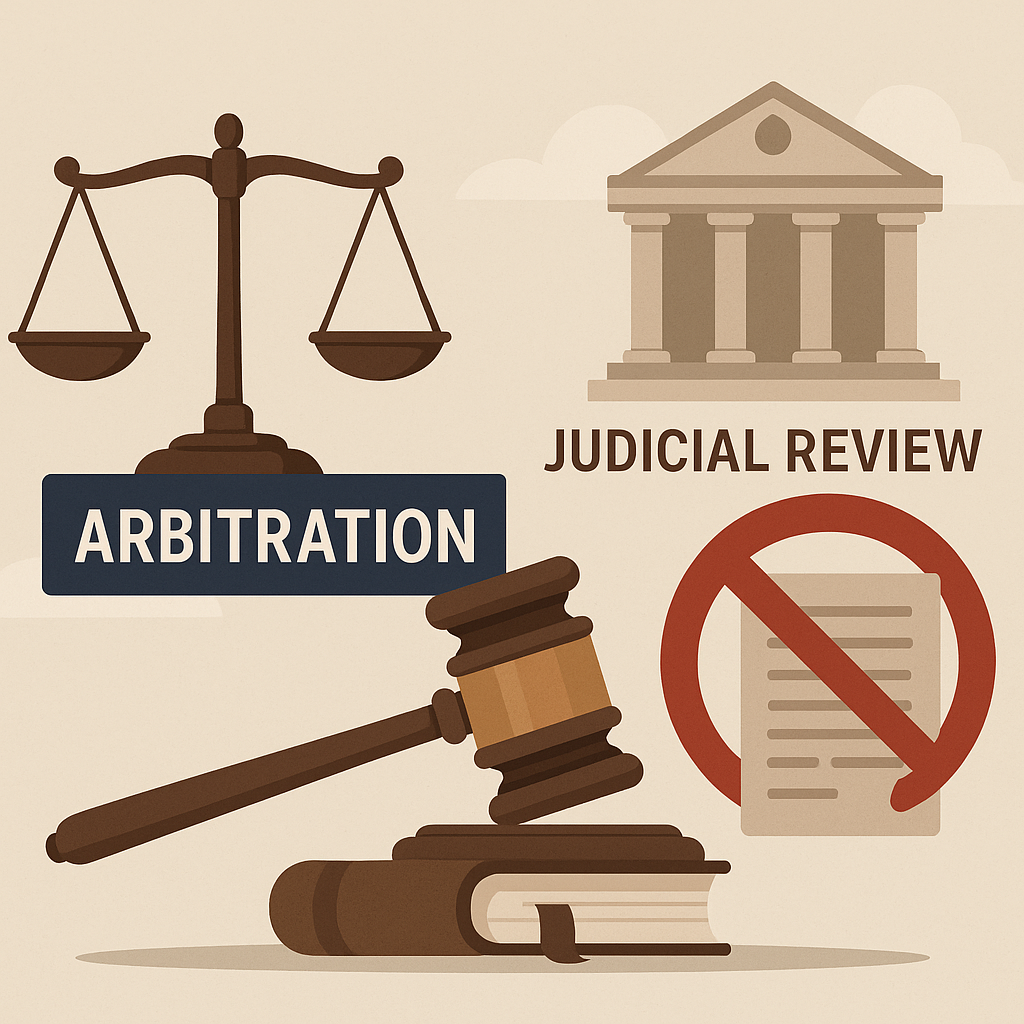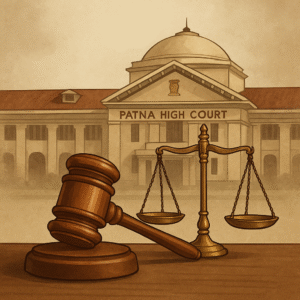Simplified Explanation of the Judgment
In this case, the Patna High Court dealt with a dispute involving the appointment of an arbitrator between a government-owned publishing corporation (the petitioner) and a printing firm (the respondent). The conflict arose out of a tender contract under the Sarva Shiksha Abhiyan for textbook supply.
The contract had a clause specifying that any disputes should be resolved through arbitration by the Principal Secretary, HRD, Government of Bihar. However, when disputes arose and led to the cancellation of the contract, the respondent approached the High Court under its writ jurisdiction.
Interestingly, both parties eventually agreed to refer their dispute (except for the issue of debarment) to arbitration by a retired Judge of the Patna High Court, who was not named in the original contract. The High Court, through its writ order in 2016, recorded this mutual agreement and appointed a new arbitrator.
Later, this arbitrator was replaced with another retired Judge due to his appointment as Lokayukta. Both parties voluntarily participated in this arbitration. But during the arbitration proceedings, the petitioner developed grievances and tried to terminate the arbitrator’s mandate under Section 14 of the Arbitration and Conciliation Act, 1996, before the District Judge. This application was dismissed.
Subsequently, the petitioner approached the High Court again, this time under Section 11(6) of the Arbitration Act, asking for the appointment of a new arbitrator, claiming that the previous appointment was not valid as it arose out of a writ proceeding and was therefore coram non judice (outside the court’s jurisdiction).
The High Court rejected this request and clarified important principles regarding arbitration:
- Once parties agree on an arbitrator and participate in the proceedings, they cannot later challenge the process as being without jurisdiction, especially if they have already tried and failed to remove the arbitrator through proper legal channels.
- The High Court held that the appointment of the arbitrator through a writ petition was valid, because it was based on the consent of both parties.
- Since the petitioner had earlier attempted to remove the arbitrator through a Section 14 application (which was rejected), it was now barred by the principle of res judicata (the matter has already been decided and cannot be raised again).
In conclusion, the Court ruled that the arbitral tribunal was validly constituted and dismissed the petition.
Significance or Implication of the Judgment
This judgment serves as a key reminder that consent-based appointments of arbitrators through writ proceedings are valid if both parties agree. It also reaffirms that once a party has tried and failed to remove an arbitrator through a statutory route, they cannot re-litigate the same issue under a different provision.
For government bodies and contractors, especially in Bihar, this decision reinforces the importance of respecting arbitration clauses and following proper legal procedures. It also curtails misuse of judicial remedies to delay or derail arbitration processes.
Legal Issue(s) Decided and the Court’s Decision with reasoning
- Whether a High Court can appoint an arbitrator through writ jurisdiction (Article 226)?
- Yes, if both parties voluntarily agree, as was done here.
- Whether the appointment of arbitrator in writ proceedings is coram non judice?
- No. The appointment was consensual and not outside the court’s authority.
- Whether the petitioner can file another application under Section 11(6) after having already filed under Section 14 and lost?
- No. The principle of res judicata applies. The petitioner is barred from re-agitating the same issue.
- Does consent to an arbitrator bind parties even if the procedure deviates from the contract?
- Yes. Once parties agree and submit to the arbitrator, they cannot back out later.
Judgments Referred by Parties (with citations)
- Chief Engineer, Hydel Projects v. Ravinder Nath, (2008) 2 SCC 350
- Kiran Singh v. Chaman Paswan, AIR 1954 SC 340
- Kanwar Singh Saini v. High Court of Delhi, (2012) 4 SCC 307
- Dr. Jagmittar Sain Bhagat v. Director, Health Services, (2013) 10 SCC 136
- Hasham Abbas Sayyad v. Usman Abbas Sayyad, AIR 2007 SC 1077
- Branch Manager, Magma Leasing & Finance v. Potluri Madhavilata, (2009) 10 SCC 103
- P. Anand Gajpathi Raju v. P.V.G. Raju (Dead), (2000) 4 SCC 539
- State of Goa v. Praveen Enterprises, (2012) 12 SCC 581
- Walter Bau AG v. Municipal Corporation of Greater Mumbai, (2015) 3 SCC 800
- Perkins Eastman Architects DPC v. HSCC (India) Ltd., 2019 SCC Online SC 1517
Judgments Relied Upon or Cited by Court (with citations)
- Branch Manager, Magma Leasing & Finance v. Potluri Madhavilata, (2009) 10 SCC 103
- P. Anand Gajpathi Raju v. P.V.G. Raju (Dead), (2000) 4 SCC 539
- State of Goa v. Praveen Enterprises, (2012) 12 SCC 581
Case Title
The Bihar State Text Book Publishing Corporation Ltd. v. M/s Patna Offset Press & Ors.
Case Number
Request Case No. 58 of 2020
Coram and Names of Judges
Hon’ble Mr. Justice Sanjay Karol, Chief Justice
Names of Advocates and who they appeared for
- For the Petitioner: Mr. Mrigank Mauli, Sr. Advocate; Mrs. Anukriti Jaipuriyar, Advocate; Mr. Anshuman Jaipuriyar, Advocate
- For the Respondents: Mr. Nand Kishore Singh, Advocate; Mr. Jitendra Kumar, Advocate
Link to Judgment
If you found this explanation helpful and wish to stay informed about how legal developments may affect your rights in Bihar, you may consider following Samvida Law Associates for more updates.








